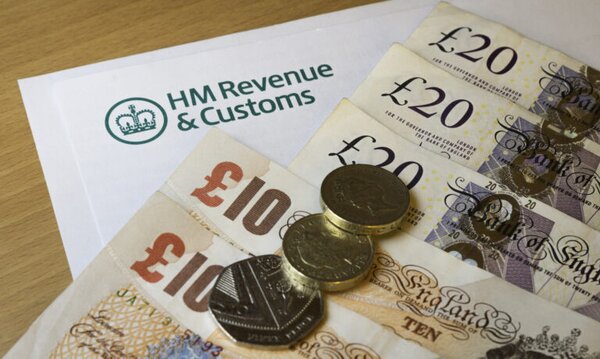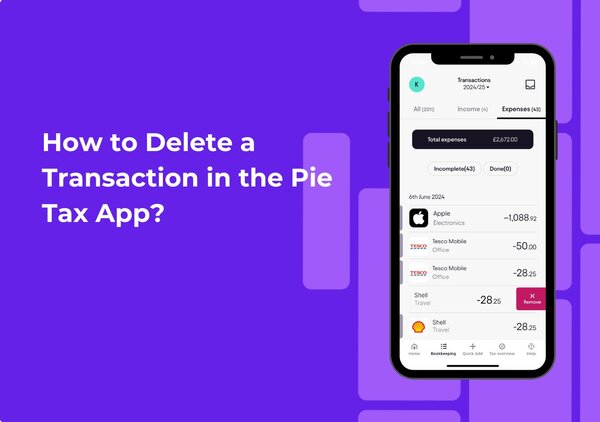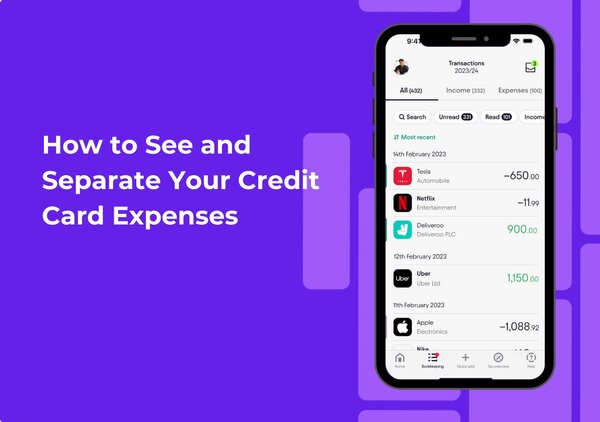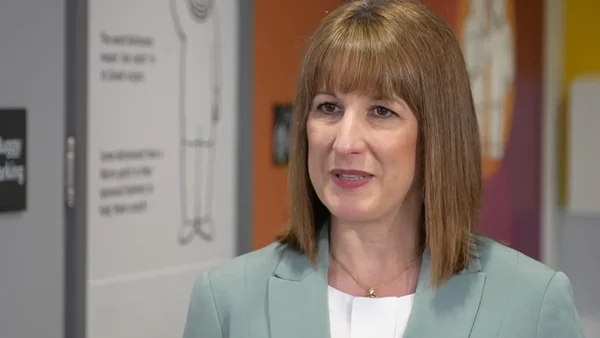Let’s Break This Down Together…
Selling online in the UK can start as a hobby, but at what point does it become taxable income?
Whether you’re clearing out your wardrobe on Vinted or running a side hustle flipping products on eBay, knowing where HMRC draws the line is essential.
From the £1,000 Trading Allowance to the signs that your activity counts as a business, this guide explains when online sales move from casual cash to taxable trade, so you can stay compliant, avoid penalties, and keep more of your profits.
Many Brits are selling items online without realising they might be creating a tax liability. HMRC makes important distinctions between casual selling and actual trading activities.
Understanding the threshold for taxable online sales is crucial for anyone regularly making money online. Missing these obligations can result in penalties and back taxes.
Pie tax, the UK's first personal tax app, helps online sellers track income across platforms and automatically calculates tax obligations. Or if you're just here to get to grips with it all, let's break it down!

Introduction to Taxable Income
When you sell goods or provide services online, the money you earn may count as taxable income under UK tax rules. Taxable income is the portion of your earnings from online sales, side hustle businesses, or self-employed activities that is subject to income tax.
Whether you’re selling goods on online marketplaces, offering services online, or earning commissions, it’s important to understand what needs to be reported to HMRC.
If you’re self-employed or running a side hustle, you must report your taxable income by completing a tax return each tax year. This includes all income from online sales and any other business activities.
The good news is you can deduct allowable expenses, such as platform fees, shipping costs, and other business-related expenses, from your taxable income, which can help reduce your overall tax bill.
Accurate record-keeping is essential. Keeping detailed records of your sales, income, and expenses ensures you pay the correct amount of tax and can provide evidence if HMRC requests it.
HMRC offers clear guidance on what counts as taxable income and which expenses are allowable, so it’s worth reviewing their advice or consulting an accountant to make sure you’re following the rules.
Understanding your taxable income is crucial for staying compliant with UK tax rules, avoiding penalties, and making the most of any deductions you’re entitled to.
If you’re unsure about your tax position or how to report your income, seeking help from a tax agent or accountant can give you peace of mind and help you manage your business finances effectively.
What Makes Online Sales Taxable in the UK?
The key difference is whether you’re simply disposing of personal items or actually trading. If you offer goods or services online, you may be considered a seller for tax purposes.
Selling your old clothes occasionally isn’t usually taxable. If you sell personal items online, it is generally not taxable unless you are regularly buying or making items to sell for profit.
Regularly buying items to resell, however, likely crosses into taxable territory. HMRC uses “badges of trade” to determine if your activity is commercial.
These include factors like frequency of transactions, profit motives, and whether items were modified before selling. Each case is assessed individually.
The good news is there’s a £1,000 Trading Allowance for casual sellers. If your total trading income stays under this amount in a tax year, you don’t need to report it. For example, if you earn £1,200 from selling handmade crafts online, you must report the income above the £1,000 threshold to HMRC.
When your hobby selling crosses into business territory, that’s when tax obligations kick in. Earning extra money from side hustles, such as regular online sales, can trigger tax obligations if you meet the criteria for trading. Signs include consistent sales and operating in a business-like manner.
Income from side hustles may also become taxable if it meets the trading criteria set by HMRC.

When Do Online Sales Become Taxable Income?
Your online sales become taxable when HMRC would classify your activity as “trading” rather than just selling personal possessions. The £1,000 threshold is key. In some cases, such as selling valuable assets, capital gains tax may also apply.
This Trading Allowance is an annual tax-free allowance for casual income. Remember this applies to your combined trading income across all platforms. Platform reporting by online platforms may notify HMRC of your income, but you are still responsible for declaring it.
If you stay below this threshold, there’s no need to register with HMRC. However, once you cross it, you’ll need to register for Self Assessment.
Frequency matters tremendously. Selling a few items from your wardrobe on Vinted isn’t trading, but purchasing clothes specifically to resell regularly probably is.
I learned this the hard way when my weekend hobby of flipping vintage cameras suddenly generated £2,500 in six months. HMRC considered this trading activity despite my initial ignorance. Any income paid to you from online sales must be declared if it exceeds the threshold.
Buying items with the intention to sell them at a profit is almost always considered trading. This includes purchasing wholesale items or goods to flip online. Profits from such activities are taxable and must be reported to HMRC.
At the end of the tax year, make sure to track and report your income according to the UK tax year (6 April to 5 April). Some platforms may report your earnings over the calendar year, so it's important to reconcile both for accurate tax reporting.
Key Signs HMRC Considers You're Trading
The volume and frequency of your sales are major indicators. Selling items weekly suggests business activity, while occasional clear-outs don't.
If you're purchasing items specifically to resell them, that's a strong sign of trading. This applies whether you're buying wholesale or from charity shops.
Modifying items before reselling them (like upcycling furniture) points toward trading activity. This shows intention to add value for profit.
Having professional presentation with branded packaging or a dedicated selling account suggests you're trading rather than casually selling.
The time you dedicate to online selling matters too. If it takes up significant hours each week, HMRC is more likely to view it as business.

Platform-Specific Considerations
A digital platform is a software or website that facilitates the sale of goods or services online. Digital platform operators, such as those running eBay, Etsy, Vinted, Amazon, Facebook Marketplace, and Gumtree, are now required under new rules starting January 1, 2024, to collect and report sellers' income data to HMRC.
These new rules mean that online platforms must collect your details and income information annually for tax reporting purposes, and share information with HMRC to ensure proper tax declaration.
eBay and Etsy sellers often cross into trading territory, especially with regular sales or specialised shops.
These online platforms not only provide business-oriented features but also play a key role in reporting and compliance by collecting transaction data and providing reports to sellers summarizing earnings, fees, and taxes deducted. The data collected is shared with HMRC to improve tax compliance and reduce the UK's tax gap.
Vinted can be trickier, occasional wardrobe clear-outs aren’t usually taxable. However, if you are selling online by buying clothes specifically to resell them, this likely counts as trading, and the online platform will report your income data to HMRC.
Facebook Marketplace and Gumtree are primarily online platforms for personal sales. They’re less likely to trigger tax obligations unless you’re clearly operating a business, but if you sell online regularly, you should understand your tax obligations as these platforms may also be required to collect and share information with HMRC.
Amazon sellers with professional accounts are almost always considered to be trading. The online platform naturally positions sellers as businesses and, as a digital platform operator, is responsible for collecting and reporting your sales data to HMRC.
Digital product sales, such as downloadable artwork or e-books, are generally considered trading income from the first sale. The same applies to subscriptions. These platforms provide a service that supports both sellers and buyers, and they must collect seller information and income details for tax reporting purposes.
If you are selling online, be aware that your data will be shared with HMRC, and you will receive reports from the platform to help you track your income and tax obligations.
Registration and Reporting Requirements
Once your trading income exceeds £1,000, you must register for Self Assessment. The deadline is 5th October following the end of the relevant tax year.
Good record-keeping is essential. Save all receipts for items purchased, shipping costs, and platform fees – these can all be legitimate expenses.
You'll need to file a tax return by 31st January following the end of the tax year. For income earned in 2024/25, your return is due by 31st January 2026.
If your turnover exceeds £90,000 in a 12-month period, you'll also need to register for VAT. Special rules may apply for digital services sold to EU customers.
Missing registration deadlines can lead to penalties. It's better to register early if you think you might exceed the threshold.
Common Pitfalls and Misconceptions
Many sellers wrongly assume that “pocket money” isn’t taxable. HMRC is concerned with the nature of the activity, not how you classify the income.
Platform currency conversions can create complications. If you sell in euros or dollars, you’ll need to convert to sterling using HMRC’s approved rates.
Missing the notification deadline is a common mistake that can lead to penalties. This applies even if you didn’t realise you needed to register.
Combined income from multiple platforms is often overlooked. Your £500 from eBay plus £600 from Etsy exceeds the £1,000 allowance, making both streams taxable.
If you earn rental income from property, you must report the address of each property to HMRC and be aware that property income has separate tax allowances from trading or side hustle earnings.
The “it’s just a hobby” defence rarely works if your activities show trading characteristics. HMRC looks at what you do, not what you call it.

Consequences of Not Paying Tax
Failing to pay tax on your online sales or side hustle income can have serious consequences. If you don’t report your taxable income or pay the correct amount of tax, HMRC can impose penalties, fines, and interest charges.
These penalties can quickly add up, increasing your tax bill and putting unnecessary strain on your finances.
Not paying tax or missing deadlines for Self Assessment can also affect your credit score, making it harder to get loans or credit in the future. In more severe cases, ignoring your tax obligations could lead to legal action or even bankruptcy.
That’s why it’s crucial to register for Self Assessment, submit your tax return on time, and pay any tax due promptly.
If you find yourself unable to pay your tax bill in full, HMRC offers payment plans to help you spread the cost and avoid further penalties.
The key is to communicate with HMRC and not ignore the problem, proactively managing your tax affairs can prevent more serious issues down the line.
Staying on top of your tax obligations, keeping accurate records, and seeking professional guidance when needed will help you avoid the pitfalls of non-compliance.
HMRC provides support and guidance to help individuals and businesses understand their responsibilities, so make use of these resources to ensure you’re paying tax correctly and protecting your financial future.
Final Thoughts
The line between casual selling and taxable trading can be blurry. HMRC is increasingly monitoring digital platforms for unreported income.
When in doubt, keep records of your sales and expenses. It's better to have documentation you don't need than face questions without evidence.
If your online selling is growing, consider the tax implications early. Proper planning helps legitimate sellers maximise deductions and minimise liabilities.
Pie tax: Simplifying Trading Income Tax
Getting your online selling taxes right doesn't have to be complicated or stressful. Pie tax offers real-time calculations that show if your sales have crossed into taxable territory.
Our app seamlessly connects with to your bank to track income across multiple channels. You'll never miss when you've reached important thresholds.
The dashboard clearly shows when you're approaching tax thresholds and what obligations you'll have. We also help identify legitimate expenses you can claim.
You'll never miss a deadline with our timely reminders about registration and payment dates. Our support team is always ready to answer questions about your specific situation.
Curious about how it works? Explore the Pie tax app to see how we can take the stress out of your online selling taxes.











